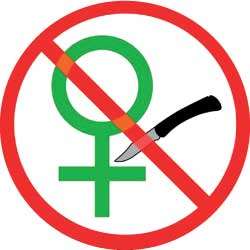Moves to medicalise FGM A Female's Basic need 'Nicked'

 2018-09-27
2018-09-27 A female may be the most controversial creation that ever happened on Earth. This is due to several reasons. Although the world depends on women to give birth and create future generations, women have in most instances been deprived of their basic right to live. A person’s sexual life is a private affair and this applies to all beings in the world. But when it comes to females, it is once again a public affair in many countries around the world. Although its origin is not known, the practice of female circumcision or Female Genital Mutilation (FGM) has been continued with since ancient times. While circumcision is practised in the Islamic community especially on men as a cultural and an obligatory duty, the same has been suggested and practised on women. However, health experts claim that male circumcision has stark differences in relation to female circumcision. Yet, the debate continues and it has once again become a topic of discussion among Muslim and community groups in Sri Lanka. Hence the Daily Mirror spoke to a few individuals in an attempt to weigh the pros and cons of this practice.
A female may be the most controversial creation that ever happened on Earth. This is due to several reasons. Although the world depends on women to give birth and create future generations, women have in most instances been deprived of their basic right to live. A person’s sexual life is a private affair and this applies to all beings in the world. But when it comes to females, it is once again a public affair in many countries around the world. Although its origin is not known, the practice of female circumcision or Female Genital Mutilation (FGM) has been continued with since ancient times. While circumcision is practised in the Islamic community especially on men as a cultural and an obligatory duty, the same has been suggested and practised on women. However, health experts claim that male circumcision has stark differences in relation to female circumcision. Yet, the debate continues and it has once again become a topic of discussion among Muslim and community groups in Sri Lanka. Hence the Daily Mirror spoke to a few individuals in an attempt to weigh the pros and cons of this practice. - Health experts claim that male circumcision has stark differences in relation to female circumcision
- These procedures are done under unhygienic and unsterile conditions and ultimately developes infections
- Pieces of a woman’s body shouldn’t be taken away unless there’s a medical reason
- The joint Muslim groups stated that the Muslim community is very concerned about moves to ban this obligatory Islamic duty
- Such a religious obligation practiced by the Muslims in keeping with the requirements of the Islamic faith is not FGM
Types of FGM
As defined by the World Health Organisation (WHO) female genital mutilation comprises all procedures involving partial or total removal of the external female genitalia or other injury for female medical organs for non-medical reasons. The four types of FGM include :Type I : Also known as Clitoridectomy, this type consists of partial or total removal of the clitoris and/or its prepuce.
Type II: Also known as Excision, the clitoris and labia minora are partially or totally removed, with or without excision of the labia majora.
Type III : The most severe form, it is also known as infibulation or pharaonic type. The procedure consists of narrowing the vaginal orifice with creation of a covering seal by cutting and a-positioning the labia minora and/or labia majora, with or without removal of the clitoris.
Type IV: This type consists of all other procedures to the genitalia of women for non-medical purposes, such as pricking, piercing, incising, scraping and cauterisation.
 “FGM has nothing to do with religion or culture”
“FGM has nothing to do with religion or culture”
-Ameena HusseinAiring her views regarding FGM, sociologist, novelist and editor Ameena Hussein said that currently Sri Lankan Muslim women don’t have a choice on undergoing circumcision or hoodectomy, as some like to call it because it is performed on infant girls or around 7-8 years of age.
“It is an irreversible procedure. I have heard of the arguments on this subject where it is said that it was done to inhibit the sexual drive of women. But now the pro circumcision lobby public relations bureau says it is for health reasons and to enhance the woman’s sexual experience. Whatever their reasons we need to ensure it is illegal to be conducted on female infants, or girl children,” opined Hussein.
Whatever their reasons we need to ensure it is illegal to be conducted on female infants, or girl children
She further said that if any adult woman, Muslim or otherwise, wishes to undergo the procedure, she should be able to. “The age of consent should be 18. This has nothing to do with religion or culture and has everything to do with the protection of the girl child,” she added.
“Procedures done under unhygienic, unsterile conditions”
 -Prof.Hemantha Dodampahala
-Prof.Hemantha DodampahalaIn his comments Consultant Obstetrician and Gynaecologist Professor Hemantha Dodampahala said that the clitoris is the most important organ in a woman’s body. “It is similar to the phallus (penis) of a male and has all the senses that bring about a sexual drive in a woman. It is rich in nerves and has a definite function in a female’s sexuality. Hence it plays an immense role in the act of sexual intercourse.
As such in my opinion, circumcision is a cruel, unkind and unfound practice. These procedures are done under unhygienic and unsterile conditions and ultimately developes infections, resulting in the closure of the urethra and the vagina.
In certain instances it may affect child birth due to a massive narrowing of the vagina. As such FGM has an impact on the entire process of a child’s delivery,” Dodampahala said.
 “Pieces of a woman’s body shouldn’t be taken away”
“Pieces of a woman’s body shouldn’t be taken away”
-Dr. Sepali KottegodaDr. Sepali Kottegoda, Executive Director of the Women and Media Collective, said that female circumcision takes away the sexual pleasure of a woman. “From what I have heard, it is being done to keep girls from getting into relationships and is a practice done in Sub-Saharan countries. It shouldn’t be done because it is an extremely cruel practice. Pieces of a woman’s body shouldn’t be taken away unless there’s a medical reason. Say for example if a person has breast cancer or appendicitis then a surgical procedure could be done, but not otherwise. This push for FGM is alien to Sri Lanka. People trying to come in, to justify an inhumane and unnatural procedure is appalling and disgusting. How can men decide about a woman’s sexual life? It is the woman who has to deal with it for the rest of her life. However there may be some women who would say that it is good, but we need to ask whether there is an element of choice. From what I see there doesn’t seem to be a choice. Hence, in that case are Sri Lankans – those citizens from a secular state- going to sit back and watch?”
Call for female circumcision to be medicalised
During early September, a number of Sri Lankan Muslim groups called on the Government to medicalise female circumcision. In representations made to the Parliamentary Committee on Women and Gender, members of the All Ceylon Jamiyathul Ulama, All Ceylon YMMA Conference, Centre for Islamic Studies and United Religions Initiative urged the Ministry of Health to withdraw a recent circular prohibiting medical professionals from carrying out female circumcision.In their submission, the joint Muslim groups stated that the Muslim community is very concerned about moves to ban this obligatory Islamic duty on the grounds that it is Female Genital Mutilation (FGM). They said that the practice of female circumcision is an obligatory Islamic duty which confers a number of health benefits and that it is not FGM.
As such in my opinion, circumcision is a cruel, unkind and unfound practice
 Hence they condemned the move to ban the practice of female circumcision by legislation and/or Government bodies. They further urged that no moves should be
Hence they condemned the move to ban the practice of female circumcision by legislation and/or Government bodies. They further urged that no moves should bemade in this regard in which case they would consider it as an unwarranted intrusion and an infringement of their religious duties guaranteed by the law and constitution of Sri Lanka.
The group further stated that although Muslims wholeheartedly support the abolition of traditional practices harmful to women and children such as FGM, in case it is shown to exist in Sri Lanka, the Islamic practice of female circumcision is vastly different.
As such religious obligation practiced by the Muslims of the country for centuries in keeping with the requirements of the Islamic faith is not FGM.
The submission further stated that since this is a religious obligation, almost all Muslim Women and girls would have to undergo the procedure by hiring the services of traditional female circumcisers known as Ostha Mamis in case doctors refuse to perform this procedure citing the above mentioned circular. This could lead to serious medical complications which would amount to FGM.
How can men decide about a woman’s sexual life
Long -term consequences
Once the clitoris and the surrounding tissues are removed the girl or woman is at risk of developing infections. Hence there could be long term consequences which include :Urinary problems (painful urination, urinary tract infections);
Vaginal problems (discharge, itching, bacterial vaginosis and other infections);
Menstrual problems (painful menstruations, difficulty in passing menstrual blood, etc.)
Sexual problems (pain during intercourse, decreased satisfaction, etc.);
Increased risk of childbirth complications (difficult delivery, excessive bleeding, caesarean section, need to resuscitate the baby, etc.) and newborn deaths;
Need for later surgeries: for example, the FGM procedure that seals or narrows a vaginal opening (Type III) needs to be cut open later to allow for sexual intercourse and childbirth (de-infibulation).
Sometimes genital tissue is stitched again several times, including after childbirth, hence the woman goes through repeated opening and closing procedures, further increasing both immediate and long-term risks;
psychological problems (depression, anxiety, post-traumatic stress disorder, low self-esteem, etc.);
